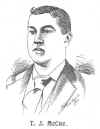the incumbents in the treasurer's and the county clerk's offices had drawn salaries as high as the limit, the opposition tried to get control of the convention; in point of numbers they, in fact claimed supremacy, but the whooping and boisterous house of non-delegates made all the cry.
An appeal was taken from the decision of the chair in announcing the result of some vote, but the chair not recognizeing (sic) the appeal, would not put the question, "Is the chair susstained (sic), etc."
This gave raise to a bolt, and a mass convention was called to meet later.
The regular nominees of the "High Salary" convention were: W. D. Little, treasurer; J. W. Vining, sheriff: W. T. Shoemaker, county clerk; Moses Austin; surveyor: R. W. Wilson, register of deeds; E. C. Williams, coroner; I. P. Burke, commissioner 1st district, all of whom were defeated at the election except Sheriff Vining and Burke.
The mass convention styled 'Low Salary," irrespective of politics met and nominated E. I. Jones treasurer, G. I. Thompson sheriff, A. H. Harmonson clerk, E. Trescott surveyor, P. H. Loomis register and John Gishwiller commissioner; No nomination was made for coroner, hence Williams was elected.
Hugh T. Carlisle who edited the People at that time wrote up the convention in humorous style wherein the minutes of the meeting ran:
"F. M. Duvall moved that so and so be.
Seconded by Dr. Chinoweth.
Motion carried.
Dr. Chinoweth moved that this and that be
Seconded by F. M. Duvall.
Motion carried."
In this manner Carlisle noted every motion from opening to closing of the convention, giving alternately the two movers, prime and second.
The Advance, L. H. Gowdy editor, supported the tickets nominated by this convention, and the following was too numerous for the adherents of the first to overcome.
Echoes of that conflict were audible in many a convention afterward, dying out slowly until now it is a reminiscence, not one of the prime actors even remembers the name of the chairman whose sunflower gavel pounded for order.
 Thomas Joseph McCue was born in Sangamon county, Illinois, August 26. 1864.
When two years of age he moved with his parents to Chicago where he resided until the big fire of 1871, then moving to Council Bluffs, Iowa.
He served a two years' clerkship in the post office in that city; and, then went to Massilon, Ohio, where he undertook to become a machinist under Russell & Co.
He soon learned that promotion in a machine shop was extremely dilatory, and securing a place with Crane Bros., at Chicago remained until he moved to Colby, Kansas, drawn there by his father's letters filled with schemes of homesteading millions.
Tom took a homestead
Thomas Joseph McCue was born in Sangamon county, Illinois, August 26. 1864.
When two years of age he moved with his parents to Chicago where he resided until the big fire of 1871, then moving to Council Bluffs, Iowa.
He served a two years' clerkship in the post office in that city; and, then went to Massilon, Ohio, where he undertook to become a machinist under Russell & Co.
He soon learned that promotion in a machine shop was extremely dilatory, and securing a place with Crane Bros., at Chicago remained until he moved to Colby, Kansas, drawn there by his father's letters filled with schemes of homesteading millions.
Tom took a homestead
|